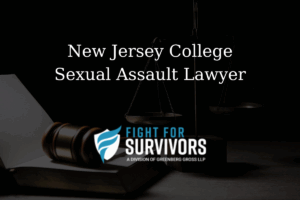
New Jersey College Sexual Assault Lawyer
Sexual assault on college campuses remains a deeply rooted and devastating issue. For many survivors, the college environment, a place meant to promote personal growth and academic achievement, becomes a site of trauma, fear, and silence. The impact of non-consensual sexual contact, harassment, or misconduct can ripple through every aspect of a survivor’s life, from mental health to academic performance and future opportunities.
In New Jersey, survivors of campus sex crimes have legal options. Whether the assault occurred in a dorm, at a campus event, or through a university-affiliated organization, survivors can pursue justice through both Title IX proceedings and civil litigation. At Greenberg Gross LLP, our attorneys are dedicated to providing strong, compassionate legal representation to college students who have experienced sexual assault. Our goal is to protect your rights, empower your voice, and help you navigate the legal system with dignity.

Understanding Campus Sexual Assault and Legal Definitions
Sexual assault on college campuses encompasses a broad range of sex crimes, including sexual contact or penetration without consent, sexual coercion, incapacitation-based assault, and aggravated sexual assault as defined under N.J.S.A. 2C:14-2. Under both New Jersey law and federal law, these acts are crimes. In many cases, the assault involves students who are acquainted or in dating relationships, making it more difficult for the survivor to report the incident due to social pressure or fear of retaliation.
Title IX, a federal law prohibiting sex discrimination in education, plays a key role in addressing sexual misconduct in colleges and universities. Title IX violations may include sexual harassment, sexual assault, stalking, or any act that denies a student equal access to education based on sex. Colleges are required to conduct investigations, present evidence fairly, and offer support services during disciplinary proceedings. Survivors can also file a complaint directly with the Department of Education’s Office for Civil Rights if they believe their college mishandled a Title IX case.
When campus sexual assault occurs, the consequences extend far beyond the initial incident. Survivors often experience lasting psychological trauma, academic disruption, and social isolation. Seeking legal counsel can be a critical step toward holding the educational institution accountable and ensuring meaningful protection and recovery for the survivor.
Title IX and Legal Remedies for College Sexual Assault
Title IX offers survivors a pathway to seek justice within the educational institution. If you experienced sexual assault at a New Jersey college or university, you may file a Title IX complaint with your school. The college is required to promptly investigate, offer supportive measures, and conduct a grievance process that may include a live hearing with cross-examination. Survivors have the right to a written response outlining outcomes, remedies, and disciplinary actions.
However, many survivors find the Title IX process overwhelming or ineffective. Colleges may fail to follow education rules, delay investigations, or allow the accused to intimidate survivors during proceedings. In these cases, hiring a Title IX attorney can ensure your rights are protected and that the institution complies with its legal obligations. In some cases, survivors may also have grounds for a civil lawsuit—particularly when a college fails to take reasonable steps to prevent known risks, respond appropriately to reports, or comply with Title IX obligations.
Legal action can help recover financial compensation for therapy, lost educational opportunities, and emotional trauma. In cases of extreme misconduct or institutional negligence, punitive damages may also apply. The decision to pursue a civil lawsuit alongside a Title IX case is deeply personal and should be made with the support of legal professionals who understand both systems.
Holding Institutions and Offenders Accountable
Survivors of sexual assault on campus are often forced to continue sharing academic spaces with their abuser. The trauma of being sexually assaulted, then facing the accused in classrooms, dining halls, or housing facilities, adds to the ongoing harm. When a university fails to separate students or protect survivors, it may be liable for further violations under Title IX.
Colleges, universities, and school districts may be held accountable for failing to prevent assault, ignoring reports of misconduct, or conducting biased investigations. Survivors also have the right to challenge school policies that create barriers to justice. Whether through cross examination during hearings or by gathering witness statements and communication records, legal representation helps ensure your case is treated with fairness and respect.
Pursuing justice means standing against a legal system that has historically failed survivors. It also means confronting the accused with facts, relevant evidence, and support from a trusted legal team. Whether your case involves sexual harassment, sexual assault, or other forms of sexual misconduct, our attorneys are here to advocate for your rights and safety.
Survivors Deserve Strong Legal Representation
Survivors of campus sex crimes need more than compassion—they need attorneys with extensive experience in both Title IX proceedings and civil litigation. At Greenberg Gross LLP, we provide legal guidance from the moment you report the assault to the conclusion of your case. We believe survivors deserve control, clarity, and confidence as they navigate this process.
We understand that each case involves specific circumstances. Some survivors were mentally incapacitated at the time of the assault. Others may have experienced assault by someone in a position of authority or while involved in a university program. Regardless of how the abuse occurred, our attorneys are ready to help you seek justice and hold the responsible parties accountable.
Legal action is never easy. Survivors often face scrutiny, disbelief, and retraumatization. That is why we approach every case with empathy and strength—fighting to ensure your academic career, personal safety, and future are protected.

Taking the First Step Toward Justice
Coming forward about sexual assault is an act of courage. Survivors deserve support, protection, and a legal system that works in their favor. Greenberg Gross LLP offers a free consultation to college students in New Jersey who have experienced campus sexual assault. We provide a confidential space to discuss your experience, explore your legal options, and plan a strategy for seeking justice.
If you were sexually assaulted on a New Jersey college campus, you are not alone. Help is available. Legal representation can make a difference—both in your personal healing and in ensuring lasting change within the institution. Your voice matters, and justice is possible.
Frequently Asked Questions
What are my options if I was sexually assaulted at a New Jersey college?
You can file a Title IX complaint with your college, pursue a civil lawsuit for damages, or both. A qualified attorney can guide you through each option based on your specific experience.
Can I sue my college for mishandling my sexual assault report?
Yes. If your school violated Title IX by failing to conduct a proper investigation or protect you during the process, you may have grounds for a lawsuit.
What is the difference between Title IX and a criminal case?
Title IX is a civil process handled by the school, focused on educational access. A criminal case is handled by the state and may result in criminal charges, prison sentences, or sex offender registration. Survivors can choose to pursue both.
How do I start the legal process?
The first step is scheduling a free consultation with an attorney. This meeting is confidential and designed to help you understand your legal rights, whether under federal law, Title IX, or through a civil case.